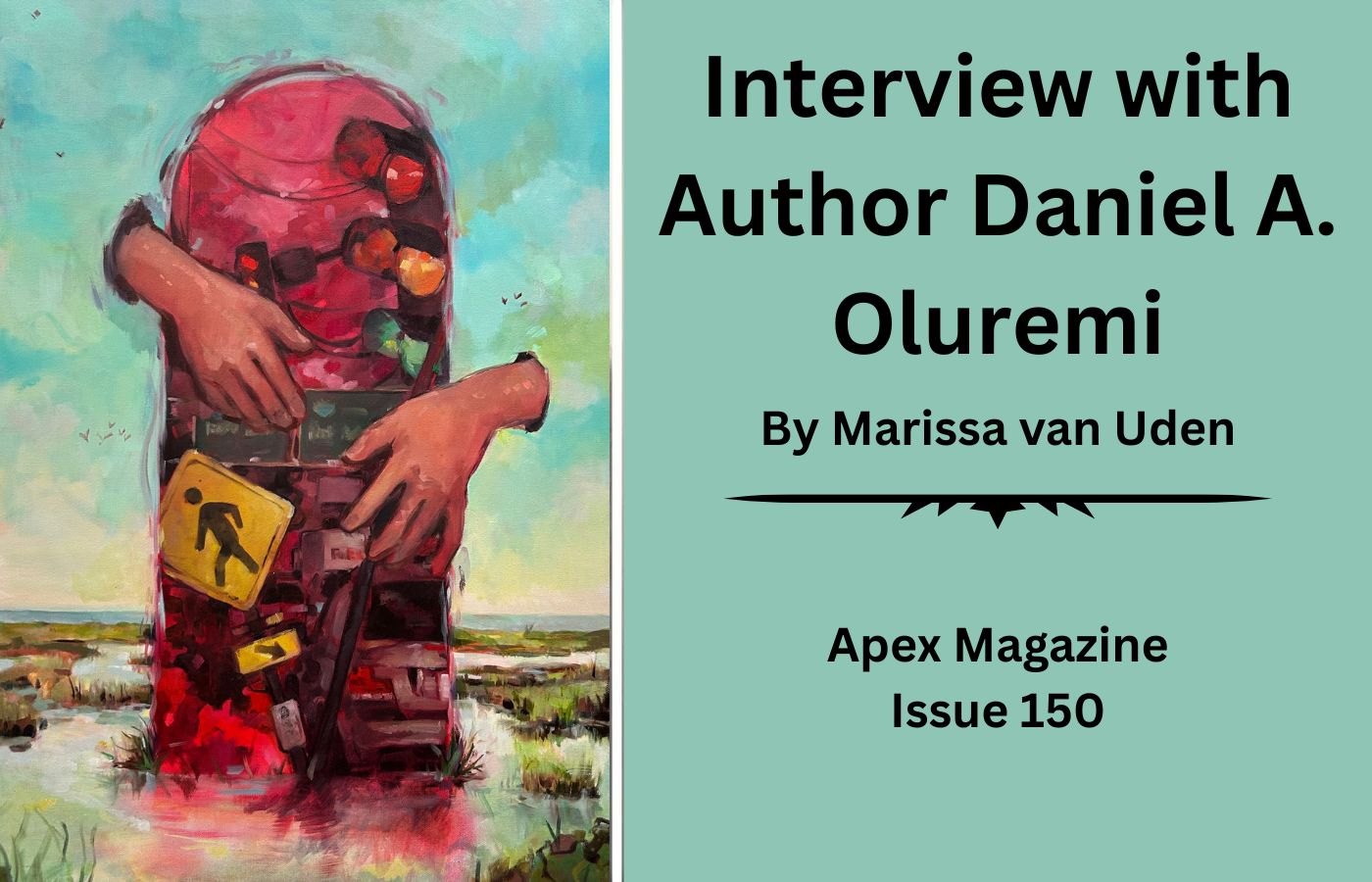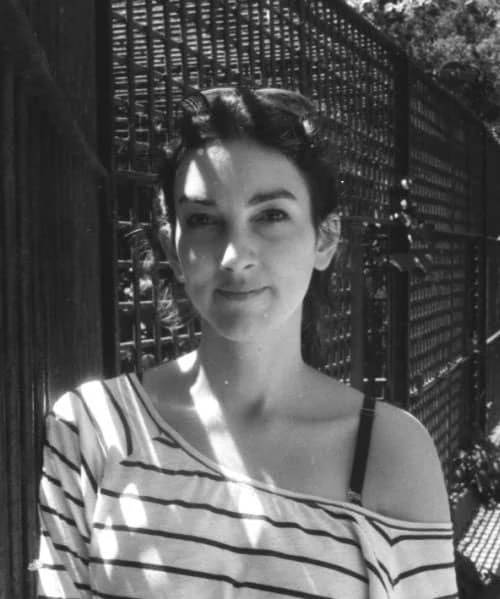
In “My Song at the Conclave of Many Sorrows,” Aderounbi takes the throne of Aresa at the moment of her mother’s death, at which time she learns that as a descendant of the throne, she may one day make a single request of the conclave of spirits who dwell in the secret ìrókò trees. Many years later, that day comes when a fast-moving peril approaches Aresa, putting all of its citizens in grave danger. Aderounbi knows she can ask the Conclave for help to save her people, but a more personal tragedy strikes—one that brings her to knees. Now she must decide whether to save the person beloved to her and risk the city, or ensure the survival of the many.
Daniel A. Oluremi is a fourth-year medical student living and studying in Ile-Ife, Nigeria. He is an Afrocentric speculative fiction writer and poet, with published or forthcoming works in other magazines including Heartlines Spec, NIGHTMARE, and The Deadlands. He is also the first-runner up of the DKA Short Story Writing Competition 2024. In his free time, he enjoys discussing books and TV shows with his friends, and he hopes to one day get a chow chow.
Marissa van Uden: Thank you so much for sitting down to chat with us today! In this heart-wrenching story, the narrator Aderounbi faces loss from all sides, from the very moment she takes the throne to the final scene. She learns that “Death was neither a servant of order, nor was it restricted by it.” Could you talk a bit about this theme and what inspired you to write about it?
Daniel A. Oluremi: Thanks for having me, Marissa! Yeah, I think an integral part of being human is the continuous process of realization. Many of the lessons we learn are very hard and heartbreaking to internalize. Sure, knowing we could die at any time, basically without much warning, can be scary, but I think there’s a peace that comes with it. A certainty we don’t have to worry about in the midst of life’s many uncertainties.
Aderounbi feels a lot, loves a lot, and that is something I don’t think death and grief can take away from someone.
MVU: From beginning to end, the story is brimming with sound and energy. There are processional songs, incantations, bells, drumbeats, and a tune that haunts the narrator. Was this something you consciously layered into the story? What is your relationship to music and using sound creatively?
DAO: Yeah, music and rhythm are a very big part of Yoruba culture. Our drums carry subtle messages embedded in beats only those with trained ears can decode. We sing grand poems about our ancestry and family lines. Our magic involves lengthy incantations that sound like fast songs. Even the language itself is heavily intonated. There would be no epic story of Yoruba folklore without layers of sound and the energy of rhythm.
As a person too, I love music and poetry. I played the violin for a large chunk of my teenage years, and I have come to appreciate how the way words sound effect how they are received and interpreted. I still have a lot to learn, but I try to incorporate some form of “sound manipulation” in the setting of my stories, whether it is a rowdy market, or a song muted by dense air, or a hymn permeating through a monastery, or in Aderounbi’s case, a message of fear and inevitability she has carried all her life.
MVU: It’s so beautifully done! I read that the ìrókò trees hold much significance in some Nigerian cultures. For readers who are unfamiliar with them, can you share a little about what they mean to you? Are there any particular mythologies, stories or works of art that this piece is in conversation with?
DAO: In the Yoruba culture, many elements of nature have spiritual significance. The Yoruba believe in spirits that protect you if you appease them. There are also bad spirits you try to ward off (or attract if you plan to use them nefariously). Spirits in the water, in the forests, in the rocks, and of course, trees. The ìrókò tree is particularly revered as a potent link between our plane of existence and the spiritual realm.
Yeah, the story of Aderounbi is inspired by a Yoruba folklore song about a trader named Olurounbi (“Ade” means “crown” in Yoruba, and is used as a prefix in the names of children born into royalty) who pledges her child to an ìrókò tree for better sales at the market. Aderounbi is a kind of subversion of this ideology. I asked the question, “What would be worthy enough a cause to make a woman who had already lost most of her family to choose to sacrifice the only one that was left?” I’d like to think Olurounbi’s story started out like Aderounbi’s own, a story of great courage and sacrifice, but has been changed into something else by many retellings through the generations.
MVU: You also write poetry. This beautiful piece “Tonight, Even the Moon Has Travelled Home,” in Heartlines Spec felt is also full of sound and energy. What was the inspiration for this poem?
DAO: Early this year, I and a friend of mine set out to read a history book titled “A History of the Yoruba People” by Professor S. Adebanji Akintoye, detailing how the Yoruba people migrated and settled down where they are now. Something about the way families and communities were structured back then really fascinated me. There was a form of communal living called the “agbo ilé,” where a family line shared a compound and a central yard, with the olórí ebí (the family head) as the spiritual and social head of the family. It seemed cool to me, especially since the modern day family doesn’t have this structure. We’re all dispersed around the world now. The poem is my homage to that time, but with a heightened presence and participation of ancestral spirits.
MVU: Recently, you were first runner up in the DKA Creative Writers' Network Short Story Writing Competition for 2024. Congratulations on this amazing recognition! What did you write about for your entry, and where can readers find it?
DAO: Thank you so much, Marissa! The title of my story was “A Dreamsnare.” It is story of a lone Dreamweaver whose granddaughter strangely falls sick, and she uncovers forces from her past and present fighting for her attention. It starts with a market too noisy to dream in. The organizers of the competition are on Facebook (FictionbyDavid), but only a snippet of my story is out at the moment.
MVU: When did you know you wanted to be a writer, and do you remember the first things you wrote about? Was there a person in your life or an author who particularly inspired you?
DAO: I think writing has always been a strength of mine since I was a child. I know I started and stopped writing a book in secondary school. However, most of my creative storytelling in my early life was visual: drawing avatars fighting at the back of my chemistry note, playing with figurines and paper armies with my younger brother. I really got into writing around the COVID-19 pandemic, and I have not looked back ever since.
I heard someone say that many people go for the STEM courses to secure enough financial stability to pursue the Arts. I think this is quite funny, and kind of true, because many of the best writers I know are medical students like me. This community of people with not just one but two things in common really encourages me and inspires me. I started submitting to magazines because one of my classmates told me to.
The author that inspires me the most is Brandon Sanderson. I’d probably ask a conclave of ìróko tree spirits to make him adopt me. His work teaches me that there is more. More to learn. More to create. More of life to really inspect and draw out into the open. His perseverance in the early days of his writing journey also inspire me to keep going.
MVU: What do you find hardest about writing? And what do you love the most?
DAO: I think the hardest thing about writing for me is endings. Unless I already have an ending for a story before I start it (like I did with Aderounbi’s story), I tend to skirt around writing an ending for too long. Writing first drafts was difficult for me in the beginning because I tend to write in patches (one sentence in one scene, one paragraph in another) rather than a continuous beginning to end format. However, I’ve learned to accept that as part of my process.
What I love most about writing are the little bursts of dopamine you get when you write something new, something that surprises even you. It feels like you’re becoming a seasoned treasure hunter and, through great patience and a lot of reading, brilliant ideas now hide in your subconscious, waiting for you to draw them out. I also really enjoy the ideas stage of writing, but I don’t like that I usually lose steam to continue some stories after this stage.
MVU: I saw that you hope to get a chow chow one day. I hope you do too! What is behind your love for this particular breed?
DAO: Oh my God, they’re so cute! If I didn’t have to spend my conclave wish on being Sanderson’s godson, I’d probably wish for a beautiful chow chow pup. Maybe two, even. I love hairy dogs, and I love how the chow chow can grow from a cute little pup into a dog that looks very mature, without losing its fluffiness.
MVU: I hope you get to meet and adopt your chow chow(s) soon! What are some books or other works of fiction that you fell in love with or found inspiring recently? What did you love about them?
DAO: I have been trying to read one short story a day since the beginning of the year. And I know this sounds pretty obvious, but there are really brilliant people out there. These stories continuously inspire me to take the craft—my use of imagination, language, and symbolism—more seriously.
I have also been reading a lot of poetry lately, and there’s a way poetry leaves a beautiful stain on your work as a prose writer. I have learned to be more intentional about my word placement and verb use. I’ve been reading Rhythm of War by Brandon Sanderson for a while now, but medical school and other obligations (including scrolling irresponsibly on TikTok) have made it hard to read much long form work.
MVU: Before we end the interview, I like to ask authors to share a charity that’s meaningful to them. Is there one that’s special to you or on your mind right now?
DAO: There is a nonprofit organization called Chess in Slums Africa, founded by Tunde Onakoya. They help bring impoverished and displaced children across Nigeria out of their unfortunate situations through chess. I think what he’s doing is very cool, and any assistance people can render him would be appreciated.
MVU: Amazing, thank you! Last question: Do you have any new publications coming out soon that readers should watch out for, or can you share a few hints about something you’re working on?
DAO: Yeah! I have a story coming out in The Deadlands about a woman who through supernatural means has refused Death seven times, and it details her last moments with Death before she crosses over to Everlasting (the title of the story). I also have a poem coming out in NIGHTMARE Magazine about money rituals titled “Wet Dollars.”










